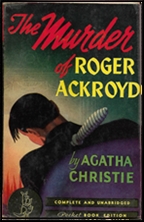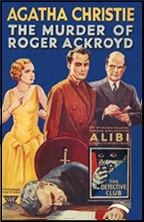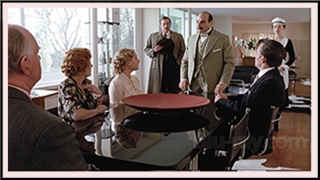Thu 28 Jan 2021
A 1001 Midnights Review: AGATHA CHRISTIE – The Murder of Roger Ackroyd.
Posted by Steve under 1001 Midnights , Reviews[8] Comments
by Barry N. Malzberg
AGATHA CHRISTIE – The Murder of Roger Ackroyd. Hercule Poirot novel #3. Collins, UK, 1926. Dodd Mead, US, hardcover. 1926. Reprinted many times. Film: Twickenham, UK, 1931, as Alibi (with Austin Trevor as Poirot). TV Movie: BBC 2000 (with David Suchet as Hercule Poirot).

This novel, Hercule Poirot’s most signatory case, is the work on which not only Agatha Christie’s reputation but that of the mystery of murder and manners, that which might be called the British “high tea school,” may be said to rest. Narrated by James Sheppard, trusted family physician and self-appointed confidant to Poirot during his investigation, the novel tracks the events leading up and then subsequent to the murder of Roger Ackroyd, a gentleman of some means and too much knowledge, “an immensely successful manufacturer of (I think) wagon wheels … a man of nearly fifty years of age, rubicund of face and genial of manner … He is, in fact, the life and soul of our peaceful village of King’s Abbot.â€

King’s Abbot is deeply shaken, as well it might be, by the murder of Ackroyd, and the distinguished Belgian detective M. Poirot, now in residence incognito and in retirement in the village, comes in to investigate. As in all fair-play puzzles of detective fiction’s Golden Age, Poirot deduces Ackroyd’s murderer through the gathering of carefully planted clues, accuses that person, and resolves the tragic case. The murderer’s identity is a stunning revelation, however, owing to a narrative device so simultaneously audacious and obvious that it may be said to have altered not only the deductive mystery but the novel form itself. (It is impossible to believe that Vladimir Nabokov did not study this work before composing Pale Fire.)

Arguably the finest cerebral detective novel ever published, The Murder of Roger Ackroyd is inarguably Christie’s finest work. If she had done nothing else, her place in the literature of crime would be secure; if Poirot had done nothing else, his “little grey cells” would have been forever noted. In fact, it is possible that if Christie had written only this novel (and perhaps The ABC Murders and And Then There Were None), her reputation would be much higher than it is (if not the accounting of her estate). But every writer is entitled to be judged by his or her strongest work, and this novel stands alone.
———
Reprinted with permission from 1001 Midnights, edited by Bill Pronzini & Marcia Muller and published by The Battered Silicon Dispatch Box, 2007. Copyright © 1986, 2007 by the Pronzini-Muller Family Trust.

January 29th, 2021 at 8:25 am
I dimly recall that Orson Welles and either the Mercury Theater-on-the-Air or, the Campbell Playhouse also do a version of the tale.
January 29th, 2021 at 8:26 am
One of the top three most recognizable mystery titles in the English-speaking world, I should think.
January 29th, 2021 at 8:30 am
Your comment popped in just before I posted mine, Lazy. You’re quite right about Orson Welles having done a radio version. From Wikipedia:
“Orson Welles adapted the novel as a one-hour radio play for the 12 November 1939 episode of The Campbell Playhouse. Welles played both Dr Sheppard and Hercule Poirot. The play was adapted by Herman J. Mankiewicz, produced by Welles and John Houseman, and directed by Welles.
Cast:
Orson Welles as Hercule Poirot and Dr Sheppard
Edna May Oliver as Caroline Sheppard
Alan Napier as Roger Ackroyd
Brenda Forbes as Mrs Ackroyd
Mary Taylor as Flora
George Coulouris as Inspector Hamstead
Ray Collins as Mr Raymond
Everett Sloane as Parker
You can listen to it at http://otrrlibrary.org
January 29th, 2021 at 1:28 pm
Nice. Yes, the audio productions from Welles and his troupe are really something. Look at that fine cast. And a Mankiewicz in the production. I’ve enjoyed too, the Mercury versions of ‘The Hitch-Hiker’, Sherlock Holmes, Dracula, ’39 Steps’ and ‘The Man Who Was Thursday’.
BTW, no mention of ‘The Mousetrap’ in the above review? I’d have thought that might deserve citing in her top conquests. Otherwise yes that ranking would also be mine, with the inclusion of ‘Calais Coach’.
January 29th, 2021 at 2:27 pm
Yes, I thought listing the cast of the Welles version ought to prove interesting. The shows Welles did for MERCURY THEATRE and CAMPBELL PLAYHOUSE were top notch productions all.
January 29th, 2021 at 8:41 pm
The idea that Watson did it was apparently suggested to Christie by Lord Mountbatten according to legend. It is surely one of her masterpieces but has so far resisted a decent screen adaptation, and without the famous gimmick it is not her best puzzle.
In the POIROT adaptation Joss Ackland is the killer and we know his identity well before Poirot reveals it, indeed merely casting Ackland in the part is pretty much a giveaway.
January 30th, 2021 at 10:43 am
Just back from the Old DVD Wall:
That’s not Joss Ackland playing the killer in the Suchet/Poirot version of Ackroyd.
Out of spoiler deference, I won’t ID the actor who does play the part, but frankly, I don’t think he even looks like Ackland.
Check IMDb for confirmation, if you need to.
January 30th, 2021 at 11:35 am
Thanks for the correction, Mike!